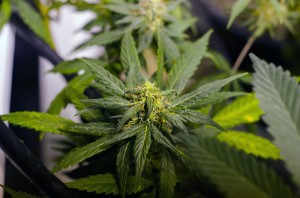
In last year’s statewide elections, 53 percent of voters approved the Alaska Marijuana Legalization ballot. People 21 or older can now possess up to one ounce of marijuana and up to six plants.
With possession laws in place, the state is now working out commercial laws. The Marijuana Control Board is set to issue its first commercial licenses in May of next year.
With the commercialization of marijuana on the horizon, many cities are scrambling, and Nome is no exception. At this month’s meeting, the City Council had plans to discuss what it would look like if the city allowed the commercial sale of marijuana.
In Western Alaska, 57 percent of voters were in favor of it, while in Nome, the margin was slightly smaller, but still a clear majority at 56 percent.
Despite the wide margin, the City Council still spent time debating their options. Councilman Stan Anderson was the most outspoken about avenues for opposing the sale of marijuana.
The option to petition was brought up, but City Manager Tom Moran questioned Anderson’s position on the matter.
“Why would we reinvent the wheel? This has gone through an official election and Nome has said ‘yes,’” explained Moran.
“Nome has said ‘yes,’ but the city has not said one way or another,” Anderson challenged.
“Well, we do what our constituents tell us to, right?” asked Moran.
Mayor Richard Beneville, along with most other council members, wanted to listen to the voters and leave it at that.
“The public of the state has voted, and the public of Nome has voted. And whether or not they won by 20 votes or by 2,000 votes is irrelevant to the fact that it passed,” said Beneville. “That’s America. That’s democracy.”
With that settled, the discussion turned towards the specifics of how it would happen in Nome. The biggest obstacle? Transportation.
“Can’t go by air, can’t go by boat, those are federal,” explained councilman Matt Culley. “We’re going to have to have a cultivation center, someone will have to fly up and test it if that’s what happens here.”
Since marijuana hasn’t been legalized at the federal level, it’s still illegal to transport it by boat or plane, which are both federally regulated.
Since Nome is off the road system, the only option is by motorized vehicle.
“I suppose someone could take a snow machine from Fairbanks, but that does not seem like the most efficient way to transport goods,” posited Charles Cacciola, an Anchorage-based attorney.
And to clarify, it would have to be a licensed agent driving the snow machine. Cacciola was asked by City Manager Moran to update the council on Alaska’s marijuana regulations.
So since it’s illegal to transport by boat or plane, and highly unlikely by snow machine, one of the only options left for Nome, and any other city or town in bush Alaska, is home-grown.
Or, as councilman Culley calls it, “Nome grown.”
But even that’s tricky. First, a licensed cultivation center would need to be built. And then, before being sold in a store, any and all marijuana products would need to be tested in a licensed marijuana testing facility.
So even if there was a place to grow the plant, it would still need to be shipped out of town to be tested.
Which brings the debate back to the issue of transportation. But, as one council member suggested, you can always smuggle it onto an airplane in your underwear.
Emily Russell is the voice of Alaska morning news as Alaska Public Media’s Morning News Host and Producer.
Originally from the Adirondacks in upstate New York, Emily moved to Alaska in 2012. She skied her way through three winters in Fairbanks, earning her Master’s degree in Northern Studies from UAF.
Emily’s career in radio started in Nome in 2015, reporting for KNOM on everything from subsistence whale harvests to housing shortages in Native villages. She then worked for KCAW in Sitka, finally seeing what all the fuss with Southeast, Alaska was all about.
Back on the road system, Emily is looking forward to driving her Subaru around the region to hike, hunt, fish and pick as many berries as possible. When she’s not talking into the mic in the morning, Emily can be found reporting from the peaks above Anchorage to the rivers around Southcentral.




